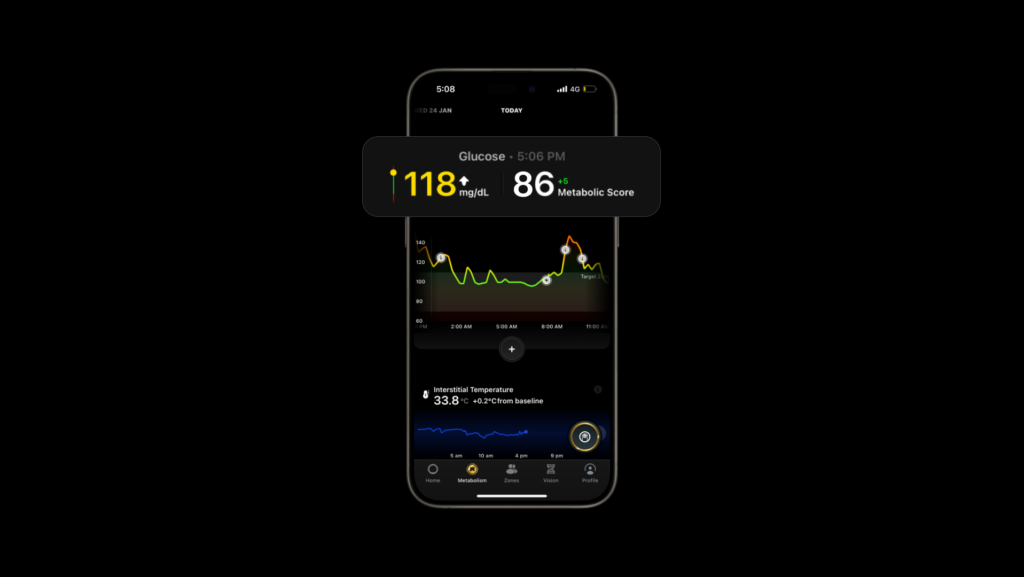Human growth hormone (HGH) is a naturally produced peptide hormone that stimulates growth and cell regeneration. The body regulates the production of this hormone in response to exercise, stress, sleep and more. When you’re recovering from an injury, participating in athletic training or losing weight, HGH is especially important. While there are some things you can do to stimulate the production of this important hormone, it is important to remember that either too much or too little of this hormone can lead to health problems.

Highlights
- Human growth hormone (HGH) is a naturally produced peptide hormone that stimulates growth and cell regeneration,
- HGH can enhance muscle function and exercise performance, and it can stimulate muscle growth and strength, especially as you age,
- While there are methods to stimulate the production of this important hormone, it is important to remember that either too much or too little of this hormone can lead to health problems.
A primer on HGH
HGH is produced by the pituitary gland, a pea-sized gland at the base of your brain. Often called the master gland, the pituitary gland is part of the endocrine system that plays a major role in regulating vital body functions and controlling the activity of other glands that secrete hormones. (26)
HGH plays an important role in muscle mass and fat metabolism. (1) It’s also responsible for other growth-related functions including cellular regeneration, sugar metabolism and bone growth. (2)
Vital for normal physical growth in children, its levels rise during childhood and peak during the growth spurt that happens during puberty. (11) Other names for HGH include growth hormone (or GH) and somatotropin.
HGH is a protein hormone made up of about 190 amino acids, considered the building blocks of protein. It is synthesized by somatotrophs, which are the most abundant type of secretory cells in the anterior pituitary gland. (27) This hormone participates with other hormones in several complex processes such as metabolism and growth.
HGH has both direct and indirect effects on the body’s physiological processes. (3) Binding its receptors to target cells creates a direct effect. An example of this is when HGH triggers the receptors on fat cells to break down triglycerides. Indirect processes occur mainly when insulin-like growth factor-I (IGF-I) (28), a peptide hormone secreted by the liver, acts on its target cells. HGH prompts the liver to secrete IGF-1, which then stimulates bone growth and muscle growth. In the muscles, IGF-1 stimulates amino-acid uptake and protein synthesis. (3)
The production of HGH is modulated by a combination of several different factors such as nutrition, stress, sleep and exercise. Other hormones also affect the production of HGH, including the following:
- Somatostatin: This is a peptide, produced by tissues all over the body, that inhibits the secretion of HGH in response to factors such as low blood glucose concentration.
- Growth-hormone-releasing hormone (or GHRH): Produced in the hypothalamus, this hormone stimulates the pituitary gland so that HGH will be released into the bloodstream. This helps to control metabolism and growth. (8)
- Ghrelin: The secretion of HGH is also stimulated by this peptide produced in the stomach. Also known as the ‘hunger hormone’, its main function is to increase appetite. (29)
When blood levels of IGF-1 are high, it leads to the reduced secretion of HGH, creating a negative feedback loop. This is because the release of somatostatin from the hypothalamus, the area of the brain that regulates the secretion of hormones from the pituitary gland (30), is stimulated and the somatotroph is suppressed. (3)
The secretion of HGH is pulsatile, and surges in secretion happen soon after the onset of deep sleep, especially during puberty. Decreased food intake and physiological stress can lead to increased secretion of HGH. Levels of HGH may decrease in response to the ingestion of food. (11)
Impact of too little or too much HGH
Abnormal secretions of HGH can lead to either a deficiency or an overabundance of the hormone. In childhood or adolescence, too much or too little HGH can lead to problems such as delayed puberty or bone weakness. (12)
HGH deficiency can cause short stature or dwarfism. This may happen because of genetic mutations or because of damage to the pituitary gland or hypothalamus following birth or during foetal development. (11)
Excessive production of HGH can cause too much physical growth. In children or adolescents, it can lead to gigantism (32), a rare disorder that causes excessive growth in height, organs and muscles. Surplus HGH can cause a condition called acromegaly (33), which is characterized by altered facial features and swelling of the hands and feet. HGH abnormalities in adults can cause symptoms such as a decline in muscle mass, increase in body fat, depressed mood, decreased energy and weakened heart. (4, 11)
The benefits of HGH
HGH helps to build, repair and maintain tissues of the brain and other tissues and organs. It plays a role in the distribution of body fat and vascular health. (24) Other benefits of HGH include:
Muscle strength: HGH can enhance muscle function and exercise performance, and it can stimulate muscle growth and strength, especially as you age. It promotes the creation of collagen, one of the most abundant proteins in the body; collagen is found in muscles, bones, skin and tendons, and is the substance that holds the body together. (31) Increased HGH levels stimulate the production of collagen, which can lead to increased muscle mass and stronger tendons. (5) The natural release of HCG can help build lean muscle, increase endurance, enhance strength and help you to recover faster after injuries or intense workouts. (7)
- Learning and memory: Research shows that HGH plays a role in cognitive function. When HGH interacts with specific receptors in the central nervous system, it may help improve memory and learning. One study conducted on rats concluded that memory impairment in adults caused by HGH deficiency that arose in childhood could be prevented if treated using early supplementation with HGH. (23)
- Bone health: Some studies show that HGH plays a role in bone health. Postmenopausal women with osteoporosis may benefit from increased levels of HGH to reduce the risk of fractures and maintain bone density. (6)
- Weight loss: HGH can help increase metabolism and improve the body’s ability to burn fat. It stimulates the breakdown of stored triglycerides into free fatty acids (9), which can be further used by the body as an energy source. It also can prevent fat cells from maturing. (10)
In the adolescent years, HGH enables the growth of cartilage and bone. In adults, HGH levels decrease and this hormone no longer stimulates growth but continues to help maintain metabolism and keep blood glucose within specific levels. (4)

How to amplify HGH?
Hormone imbalances are becoming more and more common because of the fast-paced and stress-filled lives that so many of us lead. Hormone levels can also be affected by injury or decline because of the ageing process. Healthy lifestyle choices may help to amplify HGH, which can help you to look and feel your best. (13) There are several ways to naturally stimulate your HGH levels.
Exercise
One of the most effective ways to naturally raise your levels of HGH is with regular exercise. All forms of exercise are beneficial, but the most effective option is high-intensity interval training (or HIIT). This refers to workouts that involve bouts of high-intensity exercise alternating with periods of recovery. Brief recovery intervals of 60 seconds or less during intense exercise can help to stimulate the secretion of HGH. (25)
Plasma concentrations of HGH increase within 10–20 minutes of aerobic exercise. They peak during or immediately after exercise and remain above the baseline for about 2 hours after exercise. (18) Besides triggering short-term spikes in HGH, exercise can help reduce body fat, which can also benefit your HGH levels. (14)
Intermittent fasting
Fasting leads to a significant increase in HGH, which can cause a decrease in body fat while preserving lean mass. Intermittent fasting can be achieved in different ways, such as by fasting 1–3 days a week or by significantly reducing or eliminating calories for several hours every day. (15)
A popular option is to eat within an 8-hour window each day and fast for 16 hours. This can be achieved by not eating after 8 p.m. and skipping breakfast. Another approach is to consume only 500–600 calories 2–3 days a week. Fasting can help keep insulin levels low, which is beneficial since spikes in insulin levels can disrupt the natural production of HGH. (14)
Lowering body fat
Excessive body fat impairs the production of HGH and increases the risk of illness. The most dangerous type of fat is belly fat, and the production of HGH is directly related to the amount of belly fat you have.
Obesity affects the levels of both HGH and IGF-1, but when a significant amount of weight is lost, levels return to normal. (14) Ways to reduce belly fat include tracking food intake, increasing the amount of protein and fibre-rich food consumed, reducing carbohydrates and exercising regularly. (16)
Reducing sugar consumption
HGH is one of a handful of hormones that work together to keep blood glucose in a normal range. This hormone enhances glucose synthesis in the liver and can suppress the ability of insulin to prompt the uptake of glucose in the peripheral tissues. When HGH is administered, it can also paradoxically lead to hyperinsulinemia by stimulating insulin secretion. (3)
Sugar and other refined carbs are known to increase insulin levels, so reducing sugar intake may help to optimize the levels of HGH. Excess sugar is a key factor in obesity and weight gain, which also affects HGH levels. (14)
To reduce sugar intake, start by eliminating sweets, soda and other sugary drinks. Reduce the amount of sugar used in recipes and watch for hidden sugar in products like ketchup. (17) Choose products with the least amount of added sugar. Aim for a healthy and balanced diet.
Getting a good night’s sleep
The majority of HGH is released in pulses during deep sleep, and this release is based on your circadian rhythm or body clock. Levels of HGH are highest in the earliest part of sleep because a major pulse happens shortly after falling asleep and is in association with the first episode of slow-wave (or deep) sleep. (20)
Not getting enough sleep can reduce the amount of HGH your body produces. Poor sleep quality because of sleep apnea, insomnia, restless legs syndrome or chronic pain can also affect levels of HGH. One of the best strategies to improve your long-term HGH production is by making it a priority to get an adequate amount of deep sleep.
Sleep quality tends to deteriorate with age, and the production of HGH also decreases with age. In men, changes in sleep patterns and in the production of HGH happen as early as the late 20s or early 30s. (19)
Lack of quality sleep can affect HGH levels, brain function and overall health. Here are some ways to improve sleep quality:
- Go to sleep and get up around the same time each day.
- Melatonin supplements may help to increase the duration and quality of your sleep and can also enhance the production of HGH. (14)
- Exposure to bright light or natural daylight during the day can help improve a person’s daytime energy and sleep efficiency. (22)
- Avoid looking at bright screens a couple of hours before bedtime. (21) Blue light from electronic devices can disrupt the circadian rhythm and suppress the secretion of melatonin.
Conclusion
HGH is produced naturally in the pituitary gland. It participates with other hormones in several complex processes such as growth and the metabolism of proteins, fats and carbohydrates. The benefits of HGH include enhanced muscle function, weight loss and improved learning and memory. Too much or too little of this hormone in childhood can lead to short stature, too much growth, bone weakness or other health problems. HGH abnormalities in adults can cause an increase in body fat, low energy and a decrease in muscle mass. HGH levels can be stimulated naturally with high-intensity exercise, intermittent fasting, reduced body fat, reduced sugar consumption and improved sleep quality.
Disclaimer: The contents of this article are for general information and educational purposes only. It neither provides any medical advice nor intends to substitute professional medical opinion on the treatment, diagnosis, prevention or alleviation of any disease, disorder or disability. Always consult with your doctor or qualified healthcare professional about your health condition and/or concerns and before undertaking a new healthcare regimen including making any dietary or lifestyle changes.
References







